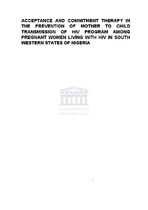| dc.contributor.advisor | Chipps, Jennifer | |
| dc.contributor.author | Ishola, Adeyinka Ganiyat | |
| dc.date.accessioned | 2018-03-14T13:46:31Z | |
| dc.date.available | 2018-03-14T13:46:31Z | |
| dc.date.issued | 2017 | |
| dc.identifier.uri | http://hdl.handle.net/11394/5775 | |
| dc.description | Philosophiae Doctor - PhD | en_US |
| dc.description.abstract | The objective of this study was to determine if introducing acceptance and
commitment therapy in the prevention of mother to child HIV transmission (PMTCT)
program using weekly mobile phone messages would result in improved mental
health status of HIV-positive, pregnant women in Nigeria.
The study used a quantitative approach using a Solomon four-group (two
intervention and two control groups) randomised design to evaluate the impact of an
acceptance and commitment therapy program. The study population was 132
randomly selected (33 per site), HIV-positive pregnant women attending four
randomly selected PMTCT centres in Nigeria. Two were Intervention and two were
Control sites which functioned as Intervention and Control groups. The intervention
groups were exposed to one session of acceptance and commitment therapy with
weekly value-based health messages sent by mobile phone for three months during
pregnancy. The control groups received only post-HIV test counselling. | en_US |
| dc.language.iso | en | en_US |
| dc.publisher | University of the Western Cape | en_US |
| dc.subject | Acceptance and commitment therapy | en_US |
| dc.subject | Mobile phone | en_US |
| dc.subject | Mother–child HIV transmission | en_US |
| dc.subject | Pregnancy | en_US |
| dc.title | Acceptance and commitment therapy in the prevention of mother to child transmission of HIV program among pregnant women living with HIV in South Western States of Nigeria | en_US |
| dc.rights.holder | University of the Western Cape | en_US |

